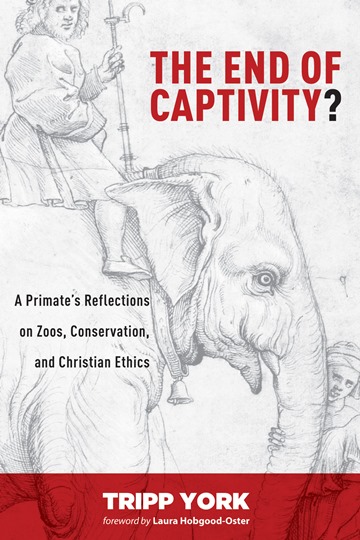Tripp York: The End of Captivity?
 Tripp York, The End of Captivity?: A Primate’s Reflections on Zoos, Conservation, and Christian Ethics (Eugene, OR: Cascade Books, 2015), ix + 135 pages.
Tripp York, The End of Captivity?: A Primate’s Reflections on Zoos, Conservation, and Christian Ethics (Eugene, OR: Cascade Books, 2015), ix + 135 pages.
Tripp York, professor in the Religious Studies department at Virginia Wesleyan College, has been deeply involved in the area of human-animal ethics for some time. Broadly speaking, his work tries to integrate the Christian tradition with improving the lives of animals. In this text, York takes up the complex subject of incarcerating wildlife in zoos. He wonders whether zoos are entertainment which exploit animals, or are they arks which are saving animals from extinction?
His efforts to answer this question, as well as many ancillary ones, involves personal reflection, research, and interviews, thereby confronting readers with writing typical of those forms. It is as if York wanted the reader to accompany him on a journey of thoughtful reflection rather than expose the reader to a decisive and well-argued diatribe.
Tripp avoids simple binary choices. In fact that is one of the maddening elements of his book. He seems to be able to raise a lot of questions but has difficulty providing a dogmatic answer that can clearly guide one’s behavior. I suspect that part of this is due to his genuine belief that the issues are complicated and resist simple solutions. However, I also wonder whether his avoidance of saying “Do this….” stems from an inherent bias against being preachy. Just consider his strange statement, “As a matter of fact, if you do have to tell me (that you’re a Christian), then you’re probably not much of a Christian. Just be a Christian” (p. 89; parentheses mine, italics his). I thought that being a Christian meant that you needed to tell people and embody it (see Matt 28).
The goal of his argumentation, though, is not in doubt. York believes that while human relationships with animals are complicated and messy, just like that experienced by zoos which are both unfortunate and needful, Christians must work toward reducing our negative impacts on animals as part of Christianity’s eschatological goal of the peaceable kingdom (cf. Isa 11:9). How will Christians accomplish this? Though York does not provide a point by point theological or rational argument for his beliefs, he does use several key ideas to ground his perspective. Let me attempt to list them. First, we need to recognize the goodness of creation and our need to care for it because all creation belongs to God. Second, we must understand that humans are animals. Third, taking a cue from Andrew Linzey, human leadership is sacrificial like Christ who humbled himself to serve humanity. Therefore, we humans should be humble and serve our fellow creatures. Finally, he uses the Greek argument that the true and good must also be beautiful. Since harming animals is ugly, therefore it should be avoided.
I thought York’s treatment of nature of freedom and the act of naming were the high points of the text. With freedom, he rightly explains that freedom is always accompanied by risk. In addition, he notes that what we think of as being free sometimes is just an illusion or a fetish. His chapter on the human tendency to name things discusses four distinct ways we name and how naming can either improve the lives of the named entity or belittle it. Though York is wrong in thinking that naming an animal as providing meat somehow prevents the namer from seeing other qualities or roles with the animal, York’s discussion is worthy of engagement.
Freedom is always accompanied by risk.
In sum, York does a good job raising important questions about the appropriate treatment and use of animals. Regrettably, York’s work and argument is really designed for theists (I am using that term broadly) who aren’t constrained about scriptural teaching regarding animals rather than Christians, who one would think would want an animal theology that considers all of scripture.
Reviewed by Stephen M. Vantassel
Category: Living the Faith, Spring 2017


